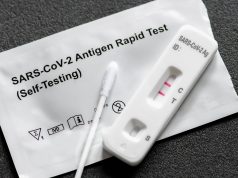Published data on Pfizer-BioNTech vaccine show similar efficacy across subgroups based on age, race, BMI, presence of coexisting conditions
FRIDAY, Dec. 11, 2020 (HealthDay News) — A two-dose regimen of a lipid nanoparticle-formulated, nucleoside-modified RNA vaccine that encodes a severe acute respiratory syndrome coronavirus 2 full-length spike protein, BNT162b2, is 95 percent effective for preventing COVID-19, according to a study published online Dec. 10 in the New England Journal of Medicine.
Fernando P. Polack, M.D., from Fundacion INFANT in Buenos Aires, Argentina, and colleagues randomly assigned persons aged 16 years and older in a 1:1 ratio to receive either two doses of placebo or the BNT162b2 vaccine candidate, 21 days apart, in an ongoing efficacy trial. Data were included for 43,448 participants who received injections: 21,720 received BNT162b2 and 21,728 received placebo.
The researchers found eight and 162 cases of COVID-19 with onset at least seven days after the second dose among participants assigned to receive BNT162b2 and placebo, respectively; for preventing COVID-19, BNT162b2 was 95 percent effective. Across subgroups defined by age, sex, race, ethnicity, baseline body mass index, and presence of coexisting conditions, vaccine efficacy was similar (generally 90 to 100 percent). The investigators reported 10 cases of severe COVID-19 with onset after the first dose: nine and one occurred in placebo and BNT162b2 recipients, respectively. Short-term, mild-to-moderate pain at the injection site, fatigue, and headache characterized the safety profile of BNT162b2.
“In the context of the current, still expanding pandemic, the BNT162b2 vaccine, if approved, can contribute, together with other public health measures, to reducing the devastating loss of health, life, and economic and social well-being that has resulted from the global spread of COVID-19,” the authors write.
Several authors disclosed financial ties to the pharmaceutical industry; the study was funded by BioNTech and Pfizer.
Copyright © 2020 HealthDay. All rights reserved.








